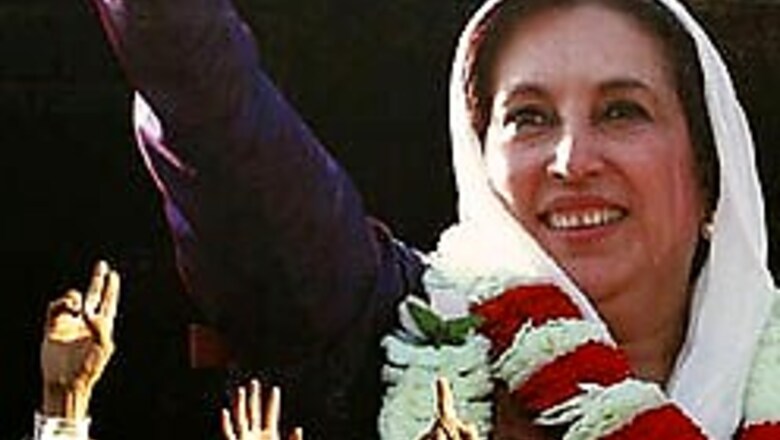
views
London: In a posthumous autobiography, former Pakistan prime minister Benazir Bhutto has named the 16-year-old son of Osama bin Laden as the leader of one of the four gangs of "designated assassins" who wanted to kill her in suicide attacks.
"I was told by both the Musharraf regime and a foreign Muslim government that four suicide bomber squads would attempt to kill me," she said in the autobiography, excerpts of which were carried by the The Sunday Times.
These were "squads sent by the Taliban warlord Baitullah Mehsuid; Hamza bin Laden, a son of Osama bin Laden; Red Mosque militants; and a Karachi-based militant group," she was quoted as saying.
Bhutto, who was killed on December 27 last year after addressing a rally in Rawalpindi, said President Pervez Musharraf's regime knew of the specific threats "against me, including the names and numbers of those who planned to kill me, and the names of others – including those in his own inner circle and in his party – whom we believed were conspiring.”
“Despite our request, we received no reports on what actions were taken before my arrival (to Pakistan from self-imposed exile) as a follow-up to these warnings,” Benazir said in her autobiography.
The naming of bin Laden's teenage son appears to bolster intelligence claims that Hamza is being groomed as a future leader of al-Qaeda.
Benazir's book also describes how a suicide bomb attack on her motorcade in Karachi when she returned home last October may have been carried out by a would-be assassin who lined the clothes of a toddler with plastic explosive to turn the child into a bomb.
According to Benazir, a man gestured to her to hold the child, before trying to hand it to police in a nearby van, which exploded soon afterwards.
"Later I was informed of a meeting that had taken place in Lahore where the bomb blasts were planned. According to this report, three men belonging to a rival political faction
were hired for half a million dollars. They were, according to my sources, named Ejaz, Sajjad and another whose name I forget,” she said.
PAGE_BREAK
Her book Reconciliation: Islam, Democracy and the West will be published in the second week of this month, the report said.
India’s power – the middle class
India's rise as a regional and international power was due to the fact that its middle class "exploded into a huge economic and political force," Benazir wrote in the autobiography.
"Democracy cannot be sustained in the absence of a stable and growing middle class. The growth of India into a regional and international economic power occurred – not coincidentally – as its middle class exploded into a huge economic and political force," Bhutto added.
Posing the question "How can a nation build a middle class? she wrote: "The first key is to build an education system that delivers hope and real opportunity. Good public educational opportunity is the key to the economic and political progress of nations, and it can be so in the Islamic world as well."
But in Pakistan $4.5 billion is spent on the military each year – an astounding 1,400 per cent more than on education, Benazir said in the book.
"Militant madrassas did not flourish there because Pakistani citizens suddenly became more religiously orthodox than ever before in our history. The militants took advantage of parents from low-income social classes who wanted a better life for their children,” Benazir said.
“If parents are so poor that they cannot educate, house, clothe, feed and provide healthcare for their children and the state fails to provide such basic human needs through public services, they will seek an alternative. The militant madrassas have become, over time, an alternative government for millions of Pakistanis,” she added.


















Comments
0 comment